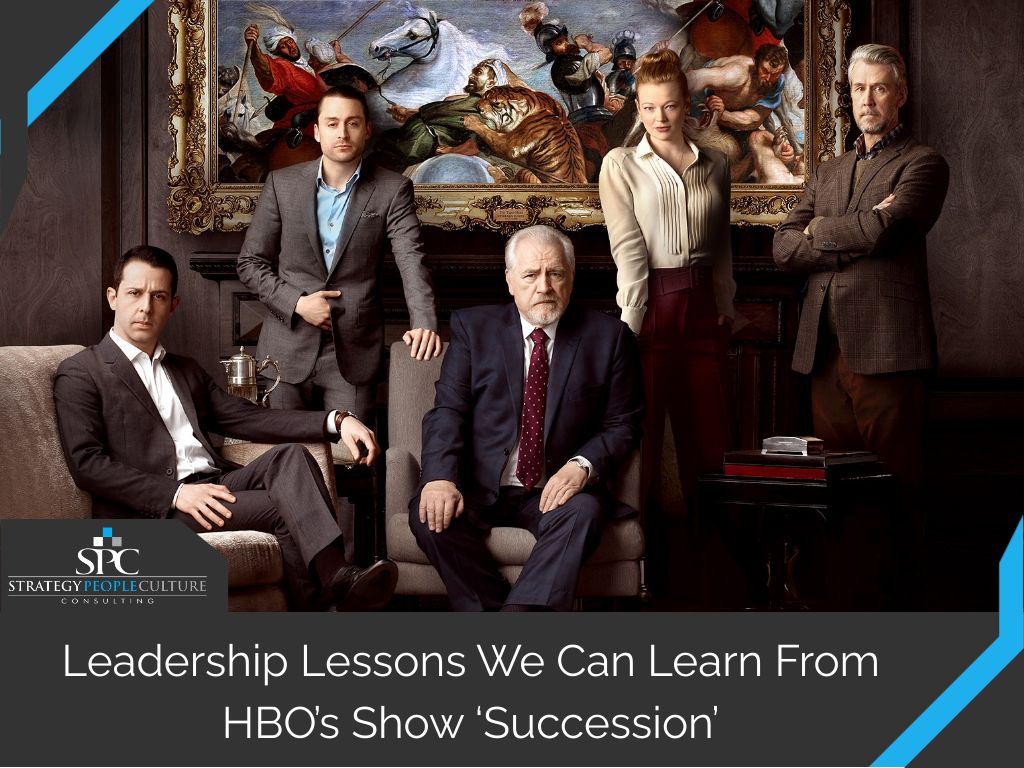Leadership Lessons We Can Learn From HBO’s Show ‘Succession’

HBO’s latest hit show, Succession, quickly made waves with its power-hungry characters and cut-throat family drama. It’s reported that season two’s episodes averaged a whopping 5 million viewers each.
People can’t get enough of the Roy family – no matter how dysfunctional they may be.
Succession centers on Waystar RoyCo, a global media and entertainment conglomerate, and the family members battling for control of its future. One could easily argue that the show’s most prominent theme is that you need to be ruthless – and sometimes immoral to be financially successful in business.
As the story unfolds, we see how this mentality hurts (and sometimes helps) the Roy family when it comes to power, politics, and of course, money.
Although this is a fictitious show and an imagined family, Succession does drive us to think about what real leadership skills look like and the lessons we can learn from the Roys.
At Strategy People Culture, it’s our job to understand exactly what makes a leader successful – and these are the most important leadership lessons we picked up while watching Succession.
Lesson 1: Collaboration Is Crucial to Success

Nearly every episode of the show features Roy family members jockeying for power – but it’s clear to the audience that no single person can achieve true success without help. True leaders, even ambitious ones like Kendall Roy, don’t work alone.
Like the Roys, your leadership team will thrive the most when based on solid and collaborative relationships.
It doesn’t matter if you’re talking to the oldest patriarch or the newest manager – collaborative leadership values the ideas and opinions of all members. This fosters a community of trust and creativity, which is undoubtedly something the Roys struggle to achieve at many points, leading to costly fixes and distractions for profit-making efforts.
Furthermore, collaboration amongst the leadership team ensures that everyone is a part of the team, not above it. In Succession, we see time and time again how one individual’s pride and ambition can harm the success of the company as a whole, both in the immediate and long term.
Lesson 2: Fear + Distrust = Poor Motivators

Logan Roy, the founder, and CEO of Waystar RoyCo, is an influential character and a cruel (if successful) businessman. He built his media empire over the decades, and he continuously prioritizes ambition over compassion or kindness, even toward his family.
Although Logan’s tactics did help him make billions of dollars, viewers of the show quickly realize that his use of fear and secrecy breeds an extremely toxic company culture.
Logan repeatedly humiliates and belittles employees and his family as a way to establish his power. He’s keenly aware of his children’s various strengths and weaknesses, and he enjoys sparking conflict to keep himself in a position of power.
It’s clear to anyone watching that this is more a negative (and costly) distraction than a constructive leadership method.
Just look at how Logan’s fear-based leadership created ill-equipped, unprepared successors. His children are motivated by their own self-interests above the company’s actual success – and they’re bad at communication and full of mistrust.
As a leader, you’ll be better off motivating your team with honesty, compassion, and skill rather than fear. This is especially true in the wake of the COVID-19 pandemic – research has found an increasing need amongst employees for encouraging, supportive leadership.
Lesson 3: Decisions Can’t Be Solely Emotional

Whether it’s disdain or fear, embarrassment or anger, emotions seem to fuel many of the characters’ choices in Succession. Unfortunately, this often results in family conflict, political turmoil, or business failures.
Although it’s acceptable for television characters to make high-pressure decisions rooted in deep emotions, that’s not a great tactic to deploy in the real world.
Every leader has emotions, but those can’t be the guiding factors when it comes to important leadership decisions. Instead, effective business leaders take their feelings and gut reactions into account but make their final decisions based on critical assessments and rational thinking.
It’s safe to say most of Logan Roy’s actions are rooted in his pride and ambition. He finds joy in manipulating others so he can stay in power, and that joy guides many of his most important (and harmful) decisions.
Additionally, the show reveals the detrimental effects of prioritizing personal attachments and goals over the well-being of a company as a whole. Every Roy family member has their own objectives and desires, and when these fuel their emotional decisions, the company suffers.
If the Roys truly wanted to be great leaders, they would focus more on balancing their emotional reactions with logic. They’d work toward company-wide goals and success while also considering their personal agendas from a rational standpoint. They would understand there is no such thing as the scenario they dubbed “an NRPI (No Real Person Involved).”
Lesson 4: Leaders Must Be Adaptable

As Charles Darwin once said, “The most important factor in survival is neither intelligence nor strength, but adaptability.”
From the uncertainty of Logan Roy’s health to the latest company disaster, there are many events the Succession family maneuvers around. Each character is constantly juggling the latest news and adapting their plans to garner power.
Now, perhaps more than ever, leaders need to be flexible and quick to alter their plans. COVID-19 and societal shifts have shown us that, and the most successful companies in recent years have been those led by adaptable leaders.
Adaptability is especially crucial when handling public perception issues, and in the case of Succession, scandals. Even the Roys realized this during the investigation into the company’s shady handling of sexual assault allegations and murder accusations tied to their cruise line.
Adaptable leaders are flexible in their ways of thinking, work to plan ahead, and actually listen to the viewpoints of others. That last one is certainly something Logan Roy and his children could work on – each seems to look for the answers they want to find, rather than broadening their minds to accept different opinions.
Lesson 5: Always Have a Plan for Handing Over the Reins

Lastly, Succession teaches us a fairly obvious lesson: it’s important to have a plan for stepping aside and determining what is best for the future of your business. It doesn’t matter whether it’s a straight sale, obtaining capital through private equity, or turning over the reins to the next in line – you need a course of action.
The show’s patriarch has lingered too long, clinging to his power, and that has left the leadership team unprepared for the future. It isn’t until Logan Roy suffers an unexpected stroke that the family finally begins to assess who will need to take over the media empire.
Regardless of how powerful a leader might be, succession is inevitable. Now is the time to prepare for the future generation. Implement a plan and provide the tools needed to help the business survive, even after you’ve turned over the reins to someone else.
This succession plan shouldn’t just be something your team talks about – it should be documented and well-understood by heirs and others in powerful company positions. This leaves less room for assumption, which plagues the characters of Succession.
Unfortunately, only about 54% of Fortune 500 companies are actively developing successors, and many companies do not have a real succession plan in place. This leaves leaders as unprepared as the Roys when it comes time for the head haunch to step down.
Although every leader hopes to oversee transitions of power in a smooth, timely manner, that’s not always the case. Episode number one of Succession taught us that when the patriarch Logan Roy suddenly entered a coma with an unclear diagnosis.
What’s your emergency succession plan? Whether it’s a health emergency or another dramatic situation, your company needs to have plans in place to provide for its future.
In Conclusion
Dubbed “Best Drama Series” at the 72nd Emmy Awards in 2021, Succession certainly has the plotline and characters to keep people interested. Although these leaders operate in a high-stake world that most of us cannot begin to imagine fully, we can all absorb some genuine themes and leadership lessons.
Examining Your Company’s Leadership or Succession Pans? Let Us Help.
If the Roy family has given you a lot to think about, it might be time to assess your own leadership skills and strengths. But don’t wait until a health scare or company scandal drives you to re-evaluate what matters.
At Strategy People Culture, we help executives identify and live their core values with tried-and-true leadership strategies. Our coaching firm has years of experience working with businesses of all sizes, and we can ensure your leadership team is better prepared for the future – whatever it may hold.
If you’re interested in setting up a personal consultation, or if you want to learn more about our group training sessions, call 833-ROCK-SPC. You can also send us a message online.
Image courtesy of HBO
